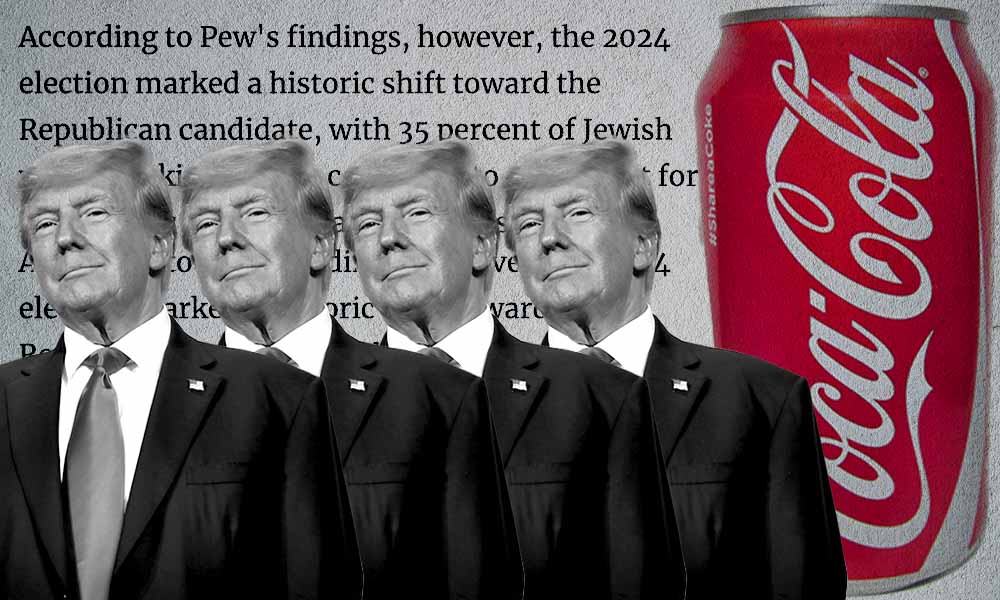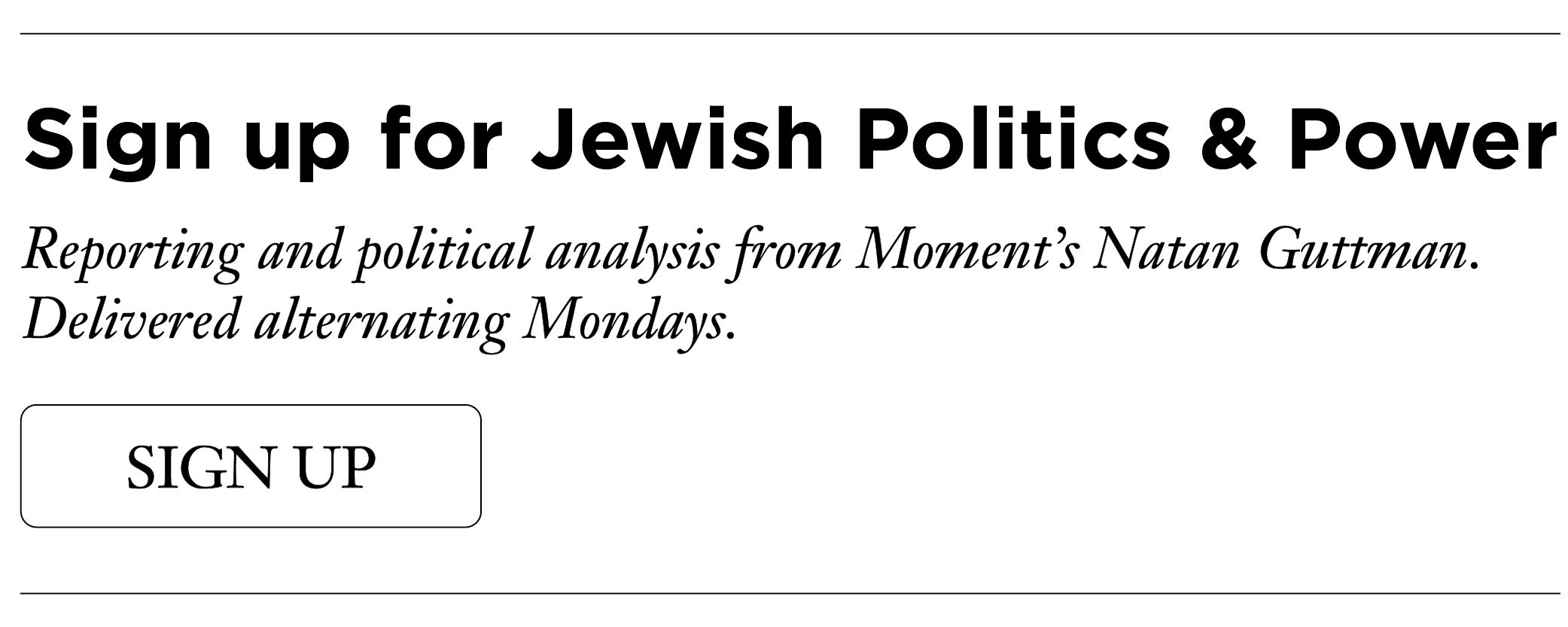
Jewish Politics & Power is published every other week. Sign up for our newsletter for updates.
1. Splitting the Community, One Piece of Legislation at a Time
A recent poll, considered credible and published months after the conclusion of the 2024 elections, found that 35 percent of American Jews voted for Donald Trump, while 63 percent cast their ballot for Kamala Harris. Historically, this is somewhat of a record for Republican candidates–and a low point for Democrats. Other polls have suggested a smaller margin, and there’s no shortage of pollsters and experts on either side who are willing to endlessly debate the accuracy of these numbers and their meaning.
But regardless of whether or not Trump got more Jewish votes than any other Republican in recent decades, it is clear that the Jewish community is split politically.
But what does this divide mean?
A flurry of legislation and executive actions in the first six months of the Trump presidency have made the fault lines within the community clearer than ever. Trump, in his actions, has managed to touch on some issues that divide Jewish voters and that are here to stay, regardless of Trump’s personality, Biden’s age and the diverging views of both parties on Israel.
Here are some examples.
2. School Funding
This has long been one of the issues separating Orthodox and ultra-Orthodox Jews from the rest of the community. Commonly known as “school vouchers,” the idea of providing taxpayer dollars for parochial schools touches directly on the values and interests of Jewish Americans. Almost all Orthodox Jews, and especially members of ultra-Orthodox and Hasidic communities, send their kids to religious schools. There, as opposed to in public schools, they can receive an education tailored to the beliefs, principles and areas of interest of observant Jews. It goes without saying that for these families, public funding for their schools is more than welcome. Add to that the fact that most ultra-Orthodox families are larger than average and that in many cases their income is lower, and it’s easy to understand the need for help in funding their children’s education.
Reform, Conservative and other liberal denominations, not to mention those who are not affiliated with any Jewish stream, are less likely to send their kids to Jewish day school, and if they do, it might be for only a portion of the K-12 journey. For them, public funding matters less than the idea behind it. Having the government fund religious activities, many of them argue, erodes the wall separating church and state, runs counter to the U.S. Constitution and will eventually harm Jewish Americans, who as a small religious minority are major beneficiaries of keeping the government out of religious matters.
Enter the “Big, Beautiful Bill,” passed by Congress and signed by Trump. This massive and ridiculously named piece of legislation includes a provision that was previously presented as a stand-alone bill known as the Educational Choice for Children Act (ECCA). What the ECCA does, in a complicated and not always clear manner, is deliver the promise of school vouchers for all.
According to the ECCA, families can donate up to $1,700 to private schools in return for a dollar-for-dollar tax credit. In practical terms, parents can make the donation, take the tax break so it doesn’t cost them a dime, and have their favorite school, most likely a religious one, get a grant of equal value that will go toward scholarships, making religious education more affordable thanks to the taxpayer subsidy. In return, the school can also choose, though it’s not stated in the law, to provide scholarships to the children whose families make the donation.
“A groundbreaking moment” is how the Orthodox Union described passage of the bill, touting it as “the largest and most promising federal school choice program ever enacted by Congress.
“By signing this historic tax credit into law President Trump brought the country one giant step closer to his stated goal of universal school choice,“ added Rabbi A.D. Motzen, Agudath Israel of America’s national director of government affairs, in a statement.
Liberal groups, meanwhile, lamented the move. In a joint letter to Congress alongside non-Jewish religious groups and education-equality organizations, they wrote that “The responsibility for religious education belongs to families, houses of worship, and other religious institutions—we do not need or want the government to be involved.”
Remember the third of American Jews who voted for Trump? This is exactly the kind of legislation that will keep them voting Republican in elections to come. After all, how many families are likely to risk losing such a valuable benefit, one that makes their children’s education more affordable and their community more sustainable?
3. Politics from the Pulpit
A similar dynamic surrounds the issue of allowing clergy to endorse political candidates in their houses of worship. The 1954 Johnson Amendment made it clear that since religious institutions and other charities enjoy tax exemptions, they cannot engage in party politics. It is a simple case of church-state separation: The tax breaks are, essentially, taxpayer dollars, and institutions receiving them should not endorse candidates.
But the year is now 2025, and to many in the ruling party, this ancient rule seemed like an unnecessary obstacle.
And so the IRS recently ruled that political endorsements within a religious tax-exempt setting will no longer be viewed as campaigning, but simply as “a family discussion concerning candidates.”
In practical terms, this means that your rabbi, from the pulpit, can call on congregants to support a certain candidate or to oppose another, without risking losing the synagogue’s tax-exempt status.
For many rabbis, as the Forward noted, this won’t matter much. Most aren’t in the business of political endorsements and would rather speak about the underlying values, not individual candidates.
But the move will open the door for more direct politics in synagogue and—it is safe to assume—will benefit one political side more than the other. And here’s why: Orthodox Jews attend synagogue regularly and consistently. They also tend to vote Republican. Taken together, this means that the Republican voice will be heard more loudly and will be more effective in these communities. Reform and Conservative Jews have significantly lower shul attendance rates. They tend to vote Democratic, but the new rule will have little impact on those who scarcely visit their synagogue and who are less obliged to follow orders from their clergy.
To be clear, Jewish Americans were not those that IRS leaders had in mind when they decided to ease restrictions on pulpit politicking. The move will mainly benefit churches and Christian clergy. Here, too, there’s a rule of thumb that explains why this is a political issue: The more often one attends church, the more likely one is to hold conservative viewpoints. So, while not exclusively, Republicans have more to gain from allowing clergy endorsements in church.
4. Does it Make a Difference?
These are relatively small fractures in the wall separating church and state that benefit some in the Jewish community and potentially harm others. Families struggling with the cost of Jewish day school will feel relief. Rabbis struggling to choose their words in heated political seasons will have an easier time. Nothing dramatic, just a couple of little perks for those on the pro-Trump end of the Jewish-American political spectrum.
But there’s a bigger picture.
Jews whose politics are right-of-center are reaping the benefits of voting for Trump and of aligning their interests with those of conservative Christians. This is true on most issues involving religion, with the exception of abortion rights, which is a key issue for Christian conservatives but not a deciding topic for Orthodox Jews.
Trump and the Republicans have shown that they reward those who support them, not only when it comes to taxes, economic benefits and geographic and state-based advantages. Now they’re adding religious issues into the mix in a way that is more pronounced and effective than in the past.
This may not add a single Jewish vote for the next Republican candidate, but it will ensure that the third who are already on board with the GOP will likely stay there.
5. A Sweet and Fizzy Silver Lining
Not all rules and regulations coming out of the Trump White House carry the risk of further dividing the Jewish community. At least one recent move is likely not only to unite Jews but also to build a bridge between the community and the rest of the American population—Coca-Cola.
Yes, that popular soda, the symbol of everything that’s wrong with American culinary tradition, is about to change.
Last week, Trump announced that thanks to his direct involvement, the soda maker has agreed to produce all its CocaCola sold in the United States with real cane sugar instead of high-fructose corn syrup.
Around the world, sugar-cane Coke is known as “Mexican Coke,” and some soda aficionados swear it is way better than the one sold in America. Jews, however, know it as “Passover Coke,” because during the holiday, the kosher-for-Passover Coca-Cola is made with sugar instead of corn syrup, which Ashkenazi Jews do not consume on Passover. This special Coke, easily identified by its yellow cap and sold only around the holiday, has been much sought after by Cola mavens who prefer the taste of pure sugar as a sweetener.
Now, as pointed out by JTA, thanks to Trump’s move, it’s Passover Coke for everyone. This will help kosher-keeping Jews who until now have had to worry about whether they’d be able to find the yellow-cap beverage at their corner store during Passover; it will benefit all other Jews who simply like the taste or believe sugar Coke is healthier; and maybe it will build a bridge to non-Jewish communities. After all, if everyone drinks the same Coke, they can also share other interests and values. The sky is the limit.
Top image credit: Willis Lam (CC BY-SA 2.0)



One thought on “Trump Rewards His Jewish Supporters, Angers Others”
Here is a comment I posted on today’s Robert Reich’s substack “So Much for Socialism.). (July 22, 2025)
The New York race for Mayor will be the battleground, against DT/GOP. Now is the time for all to unite for Zohran Mamdani. DT is, as we all know the biggest anti-semite ever, and will pull every piece of rhetoric to divide our city, as he has already shown with his war on Columbia University.